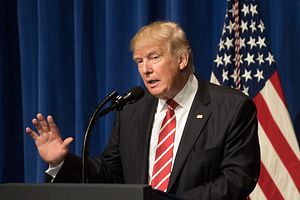Journalists, commentators, and national security specialists all seem to agree: the Trump administration is sending confusing, potentially dangerous, mixed messages in the area of America’s foreign policy. But are they missing the big picture, not seeing the forest for the tweets?
Sometimes the perceived chaos takes the form of President Donald Trump supposedly “undermining” his cabinet officers’ statements — as when he speculates that we may be heading for “a major, major conflict with North Korea” on the same day Secretary of State Rex Tillerson says the United States is willing to talk with Pyongyang.
At other times, the head-scratching is based on Trump’s own words conveying different emphases in different contexts. On one hand, he says all U.S. options, including the use of force, are on the table against North Korea. But, mindful of his own governing challenges, he also expresses empathy for the young Kim Jong-un’s being suddenly thrust into power after his father’s death.
For Asia hands, the favorite examples of the mixed message meme are his apparent reversals on the “one China” policy and in labeling China as a currency manipulator.
Yet one does not have to ascribe to the 45th president either the complex intricacies of a Machiavellian mind or a Kissingerian strategic global vision to recognize that (a) much of the criticism is somewhat shallow and self-contradictory on its face, and (b) leavened by a superb senior national security team, the president’s pragmatic, seemingly erratic style manifests a shrewd transactional approach that actually produces strategic results.
The controversy over Trump’s telephone call with Taiwan’s President Tsai Ing-wen and questioning of the one China policy — at the time excoriated by experts as perilous departures from mainstream American foreign policy — instead got China’s attention while giving a modest boost to Taiwan’s status and the promise of more to come.
The rapid-fire episodes (Trump’s Chinese shock and awe?) did not indelibly sour U.S.-China relations. On the contrary, they set the stage for Trump to entertain the Chinese leader and his wife and present a firm message on North Korea: either Beijing applies its unique leverage over Pyongyang on the nuclear and missile crisis, or America will use its own special means to solve the problem.
The now-legendary Trump unpredictability has provided him the credibility needed to convince China’s leaders to take him seriously and start cracking down on North Korea. In the back of Xi’s mind, the seed has been planted: there’s no telling what America’s Fifth Avenue cowboy might do next, on either North Korea or Taiwan.
Beijing seems to understand, even if many Americans do not, that there is no policy inconsistency between a U.S. willingness to talk with Pyongyang — as Tillerson says, about denuclearization — and a warning that the objective will be achieved one way or the other. Trump is comfortable — even if it makes others less so — playing his own dual role of good cop/bad cop.
The president and his team have made it abundantly clear to Beijing publicly, and almost certainly in private — over chocolate cake for Xi and cruise missiles for Syria — that they hold China accountable for the existential threat North Korea’s nuclear and missile present to South Korea, Japan, and the United States.
And if China doesn’t finally produce on North Korea? As the president said recently on Face the Nation, “We’ll find out whether or not President Xi is able to effect change.” Other presidents invested their hopes and wishes on Beijing’s cooperation, but the consequences of Chinese inaction simply faded into the diplomatic mists.
Trump instead is placing major explicit expectations on Xi’s shoulders — even noting that Pyongyang’s failed missile test this week showed a lack of respect for the Chinese leader. And he has left little doubt that Washington will solve the problem if Beijing can’t or won’t, saying,“We cannot allow what has been going on for a long period of time to continue.” That sounds like policy coherence.
All in all, the president has turned the China-U.S. dynamic on its head. Previous administrations have been reluctant to challenge China on human rights, trade, or the South China Sea because Washington “needs” China on North Korea. In fact, since the United States theoretically needs Chinese cooperation on virtually everything, we challenged it on virtually nothing.
Trump has reversed the logic. Even before entering into serious talks, he laid down a series of defiant markers to China: taking an unprecedented call from Taiwan’s president, putting the viability of America’s one China policy in doubt, and threatening to label China a currency manipulator.
Suddenly, it was Washington, not Beijing, that had the negotiating leverage. Only after shaking Beijing into a recognition that the old status quo is no longer acceptable has Trump been willing to soften his approach.
Thus, he first linked “one China” to trade and Xi came running, then he pivoted and linked trade to a commitment on North Korea. Now he seems willing to link another phone call with Taiwan’s Tsai to prior consultation with Xi, at which time he will undoubtedly be checking on how the Chinese mission to North Korea is proceeding.
For all the discomfiture Trump’s unorthodox negotiating style may bring to the foreign policy establishment, it seems to be working. Who knows — after Kim sees what a newly-motivated China and/or a fed-up United States can do to his regime, he may be happy to trade his nukes for a hamburger at Mar-a-Lago.
Joseph Bosco is a former China country director in the office of the secretary of defense, 2005-2006.

































